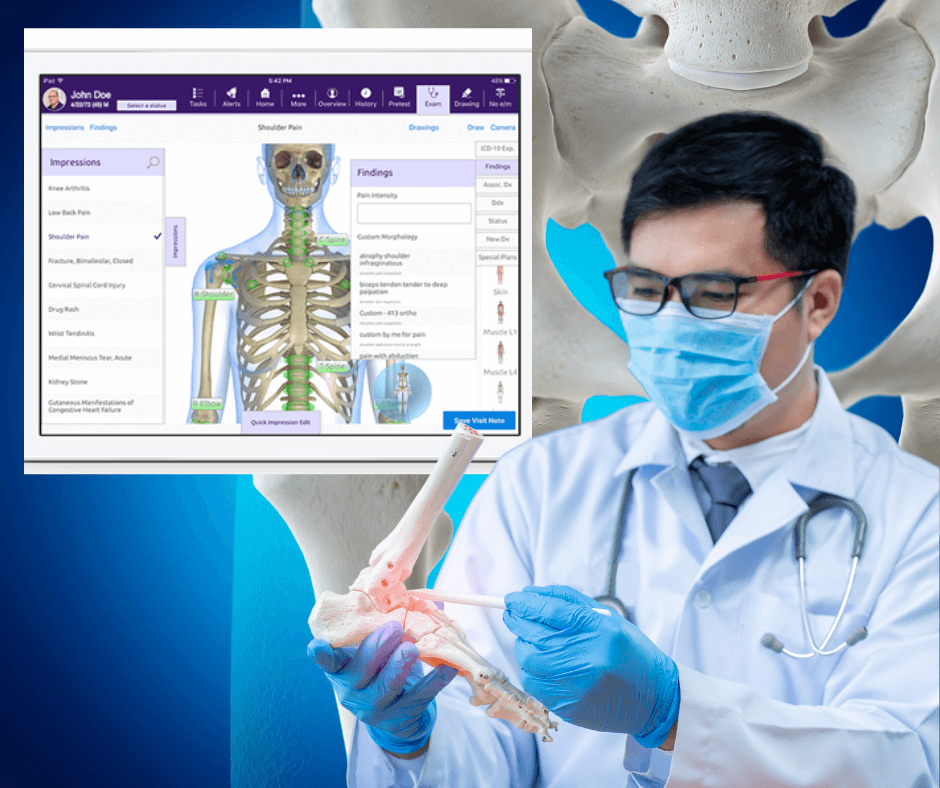10 Ways Orthopedic EHR Transforms Patient Care and Efficiency in Orthopedic Practices Discover 10 ways orthopedic EHR software is transforming patient care and efficiency in orthopedic practices, leading to better patient outcomes and streamlined workflows. Orthopedic practices are always looking for ways to improve patient care and streamline workflows. Implementing an orthopedic EHR (Electronic Health Record) system is a game-changing move for many practices, as it helps enhance the quality of care, increase efficiency, and reduce errors. In this blog post, we will explore 10 ways orthopedic EHR is transforming patient care and efficiency in orthopedic practices. Comprehensive Patient Records Orthopedic EHR allows healthcare providers to maintain detailed, up-to-date patient records. These records include patient demographics, medical history, diagnoses, treatments, and much more. Having access to comprehensive patient data enables orthopedic specialists to make informed decisions about patient care, leading to better outcomes. Streamlined Communication Orthopedic EHR systems facilitate seamless communication between healthcare providers, patients, and other stakeholders. This allows orthopedic practices to coordinate care more efficiently and ensure that everyone involved in a patient's care has access to the necessary information. Improved Diagnostic Accuracy Orthopedic EHR software often comes with built-in clinical decision support tools that can help healthcare providers make more accurate diagnoses. These tools analyze patient data and provide suggestions based on established guidelines, leading to more accurate diagnoses and more effective treatment plans. Enhanced Patient Engagement Many orthopedic EHR systems offer patient portals that enable patients to access their medical records, schedule appointments, and communicate with healthcare providers. This increased engagement can lead to better compliance with treatment plans and improved patient satisfaction. Efficient Scheduling and Resource Management Orthopedic EHR systems can help practices manage their schedules and resources more effectively. This includes tracking patient appointments, managing staff schedules, and allocating resources such as exam rooms and equipment. Seamless Integration with Medical Devices Orthopedic EHR software can integrate with various medical devices, such as imaging equipment, allowing healthcare providers to access diagnostic images and reports directly within the EHR. This streamlines workflows and ensures that critical information is easily accessible. E-Prescribing Capabilities Orthopedic EHR systems often include e-prescribing functionality, which allows healthcare providers to send prescriptions electronically to pharmacies. This can help reduce medication errors, improve patient safety, and save time for both providers and patients. Customizable Templates and Workflow Orthopedic EHR software is designed to accommodate the unique needs of orthopedic practices. Many systems offer customizable templates and workflows that can be tailored to meet the specific requirements of a practice, helping to streamline processes and increase efficiency. Enhanced Security and Compliance Orthopedic EHR systems are built with security and compliance in mind. They adhere to strict regulations, such as HIPAA, to ensure that patient data is protected and confidential. Additionally, these systems often include features such as audit trails and access controls to help practices maintain compliance with industry standards. Improved Financial Management Orthopedic EHR software can help practices manage their finances more effectively by automating billing processes and providing real-time financial analytics. This enables orthopedic practices to identify trends, monitor revenue, and make informed decisions about their financial strategies. Orthopedic EHR is transforming patient care and efficiency in orthopedic practices by providing comprehensive patient records, streamlining communication, improving diagnostic accuracy, and much more. With the adoption of orthopedic EHR systems, healthcare providers can enhance the quality of care, increase efficiency, and ultimately, improve patient outcomes.
0 Comments
Your comment will be posted after it is approved.
Leave a Reply. |

ABOUT THE AUTHOR:
Ms. Pinky Maniri-Pescasio is the Founder of GoHealthcare Consulting. She is a National Speaker on Practice Reimbursement and a Physician Advocate. She has served the Medical Practice Industry for more than 25 years as a Professional Medical Practice Consultant. search hereArchives
July 2024
Categories
All
BROWSE HERE
All
|
- About
- Leadership
- Contact Us
- Testimonials
- READ OUR BLOG
-
Let's Meet in Person
- 2023 ORTHOPEDIC VALUE BASED CARE CONFERENCE
- 2023 AAOS Annual Meeting of the American Academy of Orthopaedic Surgeons
- 2023 ASIPP 25th Annual Meeting of the American Society of Interventional Pain Management
- 2023 Becker's 20th Annual Spine, Orthopedic & Pain Management-Driven ASC Conference
- 2023 FSIPP Annual Conference by FSIPP FSPMR Florida Society Of Interventional Pain Physicians
- 2023 New York and New Jersey Pain Medicine Symposium
- Frequently Asked Questions and Answers - GoHealthcare Practice Solutions
- Readers Questions
Photos from shixart1985 (CC BY 2.0), www.ilmicrofono.it, shixart1985






 RSS Feed
RSS Feed